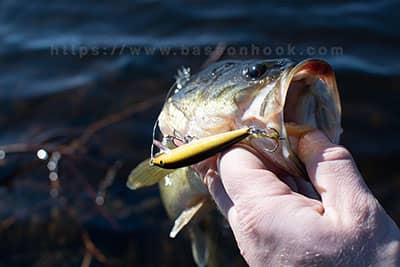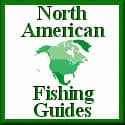Bass on Hook is Supported by our readers.
As an Amazon Associate We earn commissions from qualifying purchases with no extra cost to you.
For more informtion read our Amazon Affiliate Disclosure and Affiliate Disclosure Policies.
Catching Bass on Hook is Freshwater Fishing's Most Exciting Angling Adventure
 Catching bass on hook is a very popular outdoor sport in North America.
Catching bass on hook is a very popular outdoor sport in North America.
Almost every age group enjoys fishing for this exciting and ferocious fighter.
The two most sought after bass are Largemouth and Smallmouth bass.
They belong to the gamefish species known as "Black Bass".
The Black Bass (micropterus) species is part of the Centrarchidae family or commonally referred to as Sunfish.
The Sunfish family second only to the North American Catfish family (Ictaluridae) in species, diversity and wide spread distribution, resides predominantly in North American freshwater.
The name Centrarchidae comes from the anal fin spines of species in the family.
The common name of Sunfish is because of the bright colors displayed by males when breeding.
14 Reasons Why Black Bass Are The Most Sought After Game Fish
Based on data from the American Fisheries Society Southern Division Symposium 82 held in 1993, there are currently 14 recognized species of Black Bass.
Orignally there were only 9 species that scientists agreed on but after the symposium another 5 species based on sound scientific research were added to the list.
They are:
- Alabama Bass (Micropterus henshalli)
- Cahaba Bass (Micropterus cataractae)
- Chattahoochee Bass (Micropterus chattahoochae)
- Choctaw Bass (Micropterus haiaka)
- Florida Bass (Micropterus floridanus)
- Guadalupe Bass (Micropterus treculii)
- Largemouth Bass (Micropterus salmoides)
- Redeye Bass (Micropterus coosae)
- Shoal Bass (Micropterus cataractae)
- Smallmouth Bass (Micropterus dolomieu)
- Spotted Bass (Micropterus punctulatus)
- Suwannee Bass (Micropterus notius)
- Tallapoosa Bass (Micropterus tallapoosae)
- Warrior Bass (Micropterus warriorensis)
There have been many other sub species identitfied but not formally accepted in the science community as of the date of this writing (1993).
Some of these black bass that are often argued to have a place on the list are:
- Altamaha Bass
- Bartram's Bass
- Cuatrociénegas Bass
- Neosho Smallmouth Bass
- Witchita Spotted Bass
Fisheries scientists are continually researching the many black bass sub species brought to their attention trying to determine if they qualify as an authentic species.
This is why if you feel you know of a sub species that should be seriously looked at for inclusion you should contact your local fisheries manager.
What Makes Black Bass Such a Worthy Opponent
Black bass are a wiley and formidable foe for any angler especially a newbie bass fisher.
It takes great persistence and learning to master catching bass.
Even the best will tell you they are still learning every time they fish for bass.
The longer you fish for bass, the shorter your learning curve becomes.
Black bass have a very acute sense of smell which is one of the many tools in its arsenal of survival skills.
They are voracious pedators that feed on small bait fish like shad, bluegills and even other prey like frogs or small ducks.
Pound for pound, black bass are some of the greatest fighters when hooked.
They are commonly seen clearing the water many times trying to shake the hook.
They will strike at anything presented to them that they believe is alive.
In 1932 the world record for bass was caught and weighed 22.4lbs and again in 2009 the record was tied in Japan.
The average size most anglers deem to be a large sized bass is 5 pounds, but depending on the area they are often seen to reach up to 10 lbs or more.
Some Tips Which May Help You Catch Black Bass
Water temperatures can play an important role in finding Black Bass.
Although bass can function just fine in temperatures of 39 to 90 degrees farenheit, they are most active in water temps between 80-84 degrees.
Using a thermometer or device that gives you water temps at various depths will help you to find where the bass are holding.
It will still be up to you to catch them however.
But by knowing where they are your chances of success will increase.
During the winter months when the water is colder use a slower retrieve style of lure.
Like every other animal in this world colder weather has an effect on the effort put forth to save energy.
Having said that, bass can still outswim any lure you put in front of them no matter how cold the water is if they are hungry.
Another important factor to consider is the ph balance of the water you are fishing.
Black Bass prefer a ph balance of 7 but can still grow and survive quite well in waters with a ph balance of 5-8.5.










